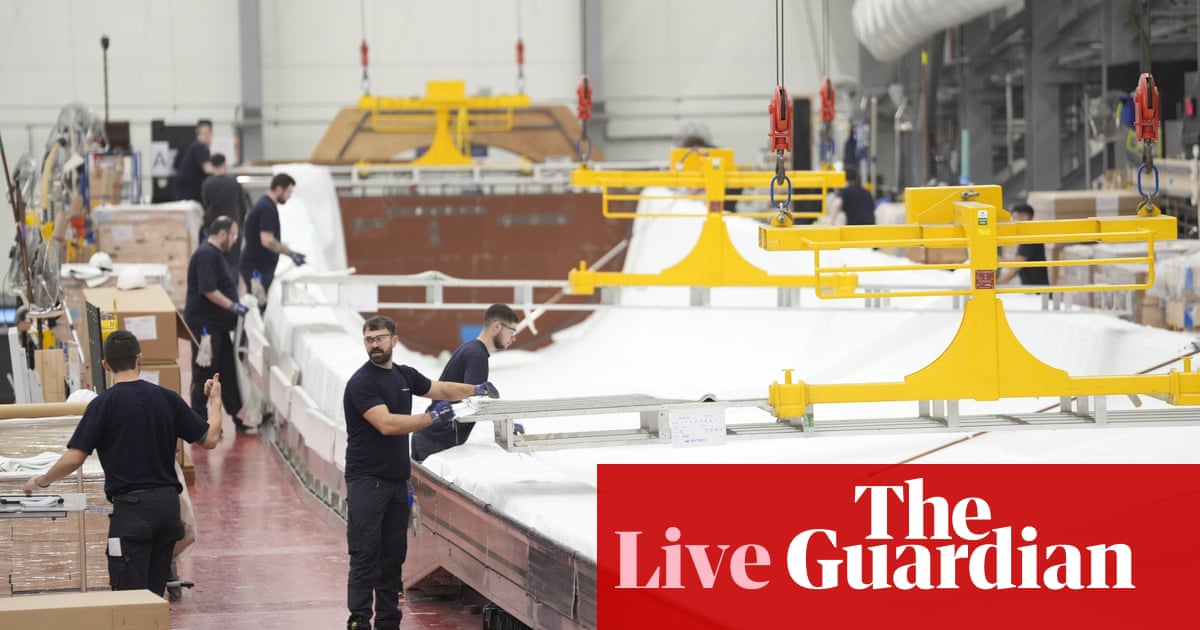Slump in export orders pushes UK private sector into decline
The UK’s private sector went into decline for the first time in 1 1/2 years, as new export orders fell at the fastest rate in almost five years, in a sign that trade wars are taking their toll on the British economy.
Weaker demand from international markets weighed on business activity in both the manufacturing and service sectors, according to a closely watched survey.
At 48.2 in April, down from 51.5 in March, the headline ‘flash’ reading from S&P Global was below the 50 mark (that separates expansion from contraction) for the first time since October 2023. While signalling only a modest rate of decline, the latest reading was the lowest since November 2022.
Firms talked about the negative impact of US tariffs and a subsequent slump in confidence among clients. Optimism about the year ahead also slumped, to its lowest level since October 2022.
Many companies flagged concerns about worsening global economic prospects in the wake of US tariffs, as well as subdued confidence regarding the outlook for domestic business conditions.
Service providers recorded a slight decline in business activity during April, which ended a 17-month period of expansion. Rising global economic uncertainty and subdued domestic demand conditions were cited as the main factors.
Manufacturers recorded a fall in production volumes for the sixth successive month. The latest decline was the steepest since August 2022 and widely attributed to weakening market conditions, especially in key export markets.
Peel Hunt’s chief economist Kallum Pickering said:
Key events
Croda to pass on tariff costs to customers
Croda International said it plans to pass on any additional costs from US tariffs to its customers, as the UK chemical maker seeks to shore up profits in a high-inflation environment.
The 100-year-old company, based in Snaith in Yorkshire, said:
Although our well-balanced local manufacturing and procurement model helps to mitigate our direct exposure to tariffs, we are assessing the likely impact and intend to apply a tariff surcharge to cover any associated incremental costs.
Its share price rose as much as 10% and later traded 7.5% higher, despite a drop in 2024 sales and profits. However in the first quarter, sales rose by 9% to £442m at constant exchange rates, and Croda stuck to its profit forecast for this year. Analysts are forecasting a pretax profit of £209.8m, according to a company poll.
The company, which makes ingredients and specialty chemicals for clients across the beauty, agriculture, pharmaceutical and industrial sectors, had already announced plans for £25m in cost-saving measures to help counter rising costs.
With alternative sources of supply limited in many cases, Croda‘s plans to pass on any incremental costs from tariffs to customers may be something clients will have to accept, according to analysts at Hargreaves Lansdown.
Companies worldwide are digesting the impact of the global trade war sparked by US president Donald Trump’s sweeping tariffs, which has fuelled fears of a recession.
Croda’s sales from North America accounted for almost 24% of its annual revenue in 2024.
EU fines Apple and Meta for breaching fair competition rules
The European Commission has fined Apple €500m (£429m) and Meta €200m for breaking rules on fair competition and user choice, in the first penalties issued under one of the EU’s landmark internet laws.
The fines under the EU Digital Markets Act (DMA), which is intended to ensure fair business practices by tech companies, are likely to provide another flashpoint with Donald Trump’s administration, which has fiercely attacked Europe’s internet regulation.
The commission fined Apple €500m for restricting app developers from distributing apps outside the company’s App Store. It said app developers could not fully benefit from alternative channels, so consumers could not discover cheaper offers.
The commission ordered the company to remove the restrictions within 60 days or risk penalty fines.
Meta, the owner of Facebook and Instagram, was fined €200m over its “consent or pay model” introduced in November 2023, which was an attempt to comply with EU data privacy rules.
Meta is expected to appeal to the European court of justice. In a statement, Meta’s chief global affairs officer, Joel Kaplan, said the commission was “attempting to handicap successful American business” while allowing Chinese and European firms to operate under different standards.
This isn’t just about a fine. The commission forcing us to change our business model effectively imposes a multibillion-dollar tariff on Meta while requiring us to offer an inferior service.
Apple has been contacted for comment.
Bank of England’s Pill: Bank ready to intervene in market turmoil if necessary

Richard Partington
Huw Pill, the Bank of England chief economist, has said the UK central bank stands ready to intervene if market volatility from Donald Trump’s escalating trade war leads to dysfunctional trading putting the stability of the UK financial system at risk.
Acknowledging an increasingly “global stormy sea” as the US president’s erratic tariff policies rattle global financial markets, Pill said:
We are alive to the potential and able to deal with it.
Speaking to students at Leeds university today, he said the Bank’s preference was to use “surgical” interventions to manage dislocations in markets that would act as a “scalpel to cut out the tumor that is causing a problem”, rather than a “sledgehammer to crack a nut” approach. He said:
It was only a few weeks ago that actually the Bank of England decided to switch from selling longer-term bonds to selling shorter-term bonds at a time that markets were a little bit febrile given recent events.
That was quite a tactical approach to dealing with these types of dislocations, and I think that maybe at the margin helped to calm markets. Although of course there are bigger forces at work now; the global stormy sea is perhaps driving those dislocations in markets more than our own actions.
Wimbledon profits rise
The Wimbledon Championships continued to defy cost-of-living concerns to boost profits and deliver record turnover for The All England Lawn Tennis and Croquet Club.
The AELTC, which runs the Championships, reported pre-tax profits of £37.1m in the year to 31 July 2024. This was up on £36.6m in 2023.
Turnover, income from ticket sales, broadcast deals, retail and food and drink sales across all of the AELTC’s activities, grew almost 7% to a record £410m.
In terms of Wimbledon – which saw Carlos Alcaraz defeat Noval Djokovic for a second year running, and Barbora Krejčíková triumph over Jasmine Paolini – turnover rose from £382.7m to £409m.
However, profits dipped slightly from £37.4m in 2023 to £35.9m last year.
The AELTC, which is embroiled in a legal fight over a planned expansion of Wimbledon, derives almost half of its income from broadcast deals.
The company said that a “small number of key broadcast markets”, notably the UK and US, “provide the majority of that income”.
The AELTC has contracts in place with the BBC up to and including Wimbledon in 2027, and with ESPN in the USA up to and including the 2035 tournament.
The Championships also delivered a record £48.9m surplus to the Lawn Tennis Association, the sport’s national governing body.
The AELTC employed an average of 511 staff last year, up from 497 in 2023, with a salary and pension bill of £31.2m.
During the year the AELTC extended several broadcast contracts including in Central Europe with Eurosport, and struck a new agreement with Amazon’s Prime Video for rights in Germany.
Several official supplier agreements were also extended with existing partners including Slazenger, while a new agreement was signed with Emirates as official airline partner.
The eurozone reported a €24bn surplus in trade in goods with the rest of the world in February, higher than a year earlier.
The surplus was higher than the €21.7 bn in February 2024, according to Eurostat, the statistics office.
Exports rose by 6.2% to €248.7bn, while imports rose by 5.7% to €224.7 bn.
The United States is the European Union’s biggest trading partner, with exports rising by €51.8bn or 22%, while imports increased by €28.2bn or 2.4%. The EU’s trade surplus with the US rose to €23.6bn from €14.8bn a year earlier.
Turning to the UK, EU exports rose by just 0.2% while imports dropped by 4.4%, resulting in a €15.4bn surplus, up from €14.7bn.
Lunchtime summary: European shares stage relief rally
The relief rally continues in European stock markets, after Donald Trump said he had no plans to fire Federal Reserve chair Jerome Powell, and suggested tariffs could be lowered for Chinese imports.
-
UK’s FTSE 100 index up 118 points, or 1.4%, at 8,446
-
Germany’s Dax up 545 points, or 2.56%, at 21,838
-
France’s CAC up 157 points, or 2.15%, at 7,484
-
Italy’s FTSE MiB up 384 points, or 1.07%, at 36,332
Crude oil prices are have risen by more than 1%, pushing Brent crude, the global benchmark, to $68.13 a barrel.
Gold, which has been in demand as a safe haven investment during the recent turmoil, has fallen back by 1.5% to $3,331 an ounce, after rising above $3,500 yesterday morning for the first time.
Daniela Sabin Hathorn, senior market analyst at the trading platform Capital.com, said:
Global equities rallied on Wednesday as investor sentiment recovered, following president Trump’s denial of any intent to remove Federal Reserve Chair Jerome Powell. Earlier in the week, risk appetite had been dampened by growing concerns that the administration might interfere with another key independent institution. While the issue now appears temporarily settled, the fact that Trump’s reassurance came only in response to a journalist’s question has left some observers uneasy.
US stocks began to rebound late Tuesday, following comments from US Treasury Secretary Scott Bessent during a private event hosted by JPMorgan Chase. Bessent told investors that he anticipated a de-escalation in trade tensions with China. Adding to the optimism, Trump remarked that he would be “very nice” in upcoming negotiations with Beijing, hinting at the possibility of lowering tariffs — though not eliminating them entirely.
These developments have temporarily lifted investor confidence, providing a much-needed boost to market sentiment. Still, caution remains the prevailing tone. The continuous uncertainty — marked by political unpredictability and shifting rhetoric — continues to weigh on risk appetite. Each crisis averted offers short-term relief, but the underlying instability discourages sustained investment enthusiasm.
Global investors, once heavily overweight in US assets, have recently begun paring back their exposure. Should uncertainty persist, this reversal of “US exceptionalism” could continue, posing further downside risks for both US equities and the dollar.

Kalyeena Makortoff
NatWest’s chairman Rick Haythornthwaite has said NatWest is at an “inflexion point”, where the government is again pushing for the lender to help drive UK economic growth and competitiveness – just as it nears full privatisation 17 years after its £46bn bailout.
The chairman assured shareholders on Wednesday that NatWest had “fixed the issues of the past” and that it was “a much simpler, safer, customer-focused bank” due to the government rescue, which he thanked ministers for this morning:
It is important that we recognise the bold decision taken by the government of the day to step in and stabilise our banking system and, by extension, our economy.
We remain incredibly grateful to the government, and to UK taxpayers, for their intervention and support, which protected millions of savers, homeowners and businesses at a time of global crisis.
However, he told shareholders gathered at the Gogarburn campus that change was underway:
We are at an inflexion point not just in our bank’s history, but in the context in which we’re operating.
After almost two decades of recovery for our banks, and for our country and economy more widely, growth is rightly at the top of the national agenda. And, despite ongoing geopolitical uncertainty, competition and innovation are in focus once more.
It is clear that the rhetoric is changing and we must keep up the momentum in order to create a secure, competitive environment that promotes growth, all in the service of the customer.

Kalyeena Makortoff
Extinction Rebellion protesters have camped outside of the NatWest AGM this morning, amid concerns over amendments to the bank’s policy around fossil fuels, which they claim has opened the door to further financing of oil and gas.
Extinction Rebellion is, this morning, particularly concerned about NatWest’s ongoing support for fossil fuel company BP, chanting:
NatWest, do your best
From BP divest, divest
Kelly Shields, a senior campaign manager at ShareAction said there appear to be some “loopholes” that have allowed NatWest to keep financing BP – including that the bank is assessing BP on 2021 climate policies and footprints.
BP has recently rowed back on its green commitments in a move that sparked a shareholder rebellion last week.
NatWest said in a statement that its total exposure to the oil and gas sector amounted to 0.5% of its financing activity. A spokesperson said:
The UK’s energy transition is dependent on many evolving factors – be that policy, technology or societal response – and we confirmed in our sustainability report earlier this year that we would review our climate targets during 2025, ensuring our policies and frameworks are aligned to the UK’s broader transition outlook.We will continue to be transparent on our policy and risk criteria in this area and will publish these once the review is completed.

Kalyeena Makortoff
In Edinburgh, NatWest Group’s annual general meeting (AGM) started at 10am.
Shareholders arived at the conference centre at NatWest’s sprawling Gogarburn campus in a cloudy Edinburgh this morning for a historic AGM, reports our banking correspondent Kalyeena Makortoff from Scotland.
This is the final shareholder meeting before the bank, formerly known as Royal Bank of Scotland, fully returns to private hands, nearly 17 years after its £46bn bailout at the height of the 2008 financial crisis. The government, which once owned 84% of the lender, is due to sell off its remaining 2.99% stake in the coming weeks.
And so much has changed.
Prior to its bailout, RBS was the largest bank in the world. But having slimmed down and sold off its raft of international businesses in the wake of the government rescue, it is not even the largest in the UK: trailing behind HSBC, Barclays and Lloyds in terms of assets.
And while executives are due to address shareholders this morning from the £350m Gogarburn campus that came to symbolise the excesses of its disgraced former boss Fred Goodwin, the message will be quite different than his predecessor.
Under chief executive Paul Thwaite, it’s now a message of moderation, careful assessment of risk, and assurances that the bank is much safer than the one that sparked a recession and left Edinburgh’s financial sector in tatters in 2008.
But whether shareholders expect the bank to take bigger risks once the privatisation is complete, remains to be seen.
Carsten Brzeski, global head of macro at ING, said:
The April PMIs [for the eurozone] did not bring the anticipated reaction after three weeks of tariff tensions and uncertainty. In fact, not all puzzle pieces match. While the broader weakening in sentiment in France and Germany is in line with expectations, the fact that the eurozone as a whole saw sentiment in the manufacturing sector even slightly improving is somewhat odd.
As so often is the case, it looks as if traditional survey-based data is reacting with some delay to big events. We wouldn’t be surprised to see a more significant drop in manufacturing PMIs next month. In any case, previous eurozone optimism is crumbling and fears of disinflation and stagnation have returned.
The only good thing about the current situation is that it is mainly man-made and could be easily reversed. However, until it is, it will again be up to the European Central Bank to do the heavy lifting in the eurozone. The announced and intended fiscal stimulus in Germany, as well as European efforts to increase defence spending, will take time to substantially boost economic activity in the eurozone.
Eurozone economy ‘broadly stable’ in April
By contrast, the eurozone’s private sector output was broadly stable in April, according to a sister survey.
Business activity was held back by a faster reduction in new orders and waning confidence – business sentiment was the lowest for almost two-and-a-half years.
Manufacturers continued to scale back purchasing, and overall inflationary pressures eased, with both input costs and output prices rising at weaker rates.
The flash Eurozone PMI output index from Hamburg Commercial Bank, compiled by S&P Global, posted 50.1 in April, only slightly above the 50.0 no-change mark that divides expansion from contraction. The latest reading was down from 50.9 in March and the lowest in four months.
In the services sector, business activity fell slightly, ending a four-month run of growth. Manufacturing production rose for the second consecutive month, and at the fastest rate since May 2022.
In Germany, Europe’s largest economy, business activity fell for the first time in four months during April after growth hit a ten-month high in March. Meanwhile, France remained in contraction and the pace of decline in business activity accelerated.
The rest of the eurozone continued to record solid growth of output, albeit with the pace of expansion easing slightly from that seen in March.
Companies were reluctant to raise output given a further reduction in new orders during April, the eleventh in as many months. Moreover, the latest decline in new business was the most marked so far this year, across both the manufacturing and services sectors.
New export orders (which include exports within the eurozone bloc) also declined. New export orders have been falling since March 2022. April saw a sharp drop in business confidence in the euro area, with sentiment the lowest since November 2022.
On top of the tariff chaos since Donald Trump’s ‘Liberation Day’ on 2 April, the rises in business costs announced in last October’s budget came into effect in April – resulting in a pretty “awful April” for many businesses in the UK.
Alex Kerr, UK economist at Capital Economics, said:
The marked fall in the composite PMI in April raises the chances that the uncertainty stemming from the US tariffs chaos will be a bigger drag on the UK economy than we expect. That said, we doubt that GDP growth at the start of Q2 will be as weak as the 0.5% 3m/3m fall the PMI suggests…
Overall, although Trump’s tariffs may prove to be disinflationary for the UK eventually, the continued stickiness of near-term price pressures suggests that the Bank of England will continue to cut interest rates gradually from 4.50% now to 3.50% in the first half of next year.



